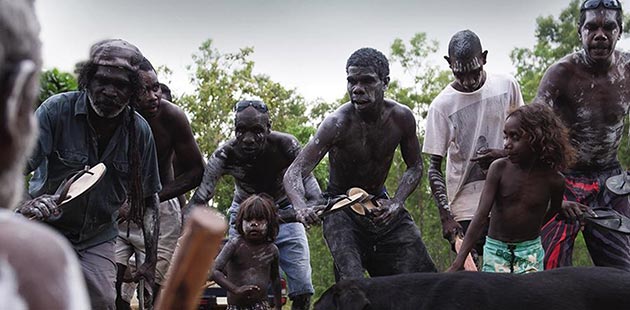 I had expected to emerge from the cinema ready for some verbal activism on behalf of the afflicted Indigenous community shown on screen. I understand and despise cultural oppression and dispossession of a beloved land. I am Irish. Aspects of this documentary however, unexpectedly silenced some of my sympathies.
I had expected to emerge from the cinema ready for some verbal activism on behalf of the afflicted Indigenous community shown on screen. I understand and despise cultural oppression and dispossession of a beloved land. I am Irish. Aspects of this documentary however, unexpectedly silenced some of my sympathies.
The documentary is set in the remote Northern Territory town of Ramingining. It is the community of origin of renowned actor, David Gulpilil who is also the narrator. Directed by Molly Reynolds, the documentary is selectively insightful. It is also introspective, negative and devoid of any hope.
We see the consequent clash between cultures when a land is invaded and colonised. Invasions are historically universal and still continue today. Most of what is decried in the documentary is due to modernisation gone wrong and not the colony-takers.
White man is blamed for every negativity in their environment including the unhealthy food sold in the only store and served to them by their own people. Yet, they are not compelled to make the dietary selections they choose. Supply equals demand. Why not order in healthier foods? Why not grow, hunt or forage for their own food using and preserving their own incredible survival skills?
The people of Ramingining are not slaves or servants and are not in famine. They are not drought affected farmers with no income or refugees with no state or status. They are not victims devoid of alternatives. I saw options not noticed and strengths and potential not utilised. I saw bad choices made but not owned and instead blamed on white man.
They are not forced to choose squalor or litter the streets with bottles and containers they have just emptied or cigarette butts they have just smoked. They are not compelled to acquire and dump cars and other items including disposable nappies. Surely, what is brought in by barge or road can be removed in the same way.
I have lived in a remote, hostile setting on one of the Aran Islands in the Atlantic Ocean. We kept the island clean and picturesque. We were also reliant upon a single shop and supplies shipped or ferried from the mainland. Nothing but potatoes would grow in the barren ground and animals were not slaughtered there. We made our own nutritious, traditional meals. Frequently, we were cut off from the rest of the world by wild Atlantic storms and hurricanes.
The Indigenous dwellers in the documentary were depicted as helpless and hopeless but blameless. The narrator, Gulpilil, was scouted as an actor/dancer at age sixteen and given opportunities and accolades in the modern context. In the same way in which his talent is recognised as his own, he owns the consequences of his own choices omitted from the picture. He has a history of alcoholism, domestic violence and imprisonment for assaulting his wife.
The footage of the lone kangaroo hopping into town chased by dogs is suspicious. It was not hunted in the bush. They are a mob animal. Was it brought in and let loose so images could be shown of it cornered by dogs inside a wire fence and bludgeoned to death by young men before being dragged away?
We were not shown presumed provision of fresh water, sanitation or health care. Surely these are present. We saw no illness, injuries or maternal mortality. Perhaps because health care and education is provided but not acknowledged.
The impressive moments shared with viewers showed skilled, speedy athletes and dancers. The Indigenous dance form with its staccato movements and rhythm is unique and riveting in its beauty. Their artwork is a genre. I felt these gentle, skilled and beautiful people had so much more going for them than what was shamefully shown or not shown.
An encore screening of Another Country will take place at the New Farm Cinemas, Brisbane on Wednesday 28 August 2019 – 7.30pm. For more information and other screening locations, visit: www.filmsforchange.com.au for details.
Image: Another Country (sourced)
Review: Michele-Rose Boylan
